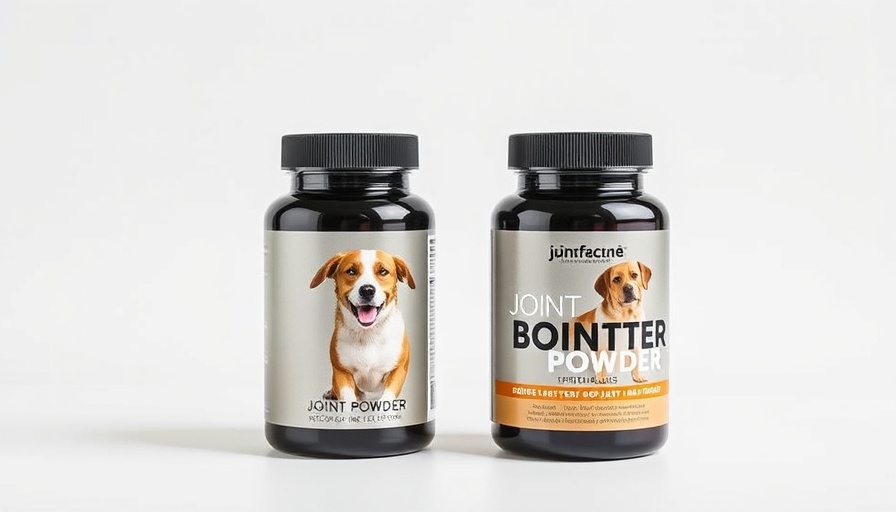
Unlocking Nature's Antihistamine: What Is Quercetin?
Quercetin is a powerful plant pigment belonging to the flavonoid family, known for its impressive antioxidant and anti-inflammatory properties. Found abundantly in fruits and vegetables like apples, blueberries, and leafy greens, quercetin has gained popularity as a natural supplement for dogs seeking relief from various health issues. Particularly recognized as "nature's antihistamine," quercetin stabilizes mast cells, minimizing allergy reactions and inflammation, thus enhancing your furry friend's overall well-being.
Allergy Management through Quercetin
As many pet owners know too well, allergies can cause intense discomfort for dogs, leading to incessant scratching, itching, and general anxiety. Quercetin proves to be a game changer in allergies management by suppressing histamine release during allergic reactions. Research indicates that dogs suffering from seasonal, food, or environmental allergies can benefit significantly from quercetin, providing effective relief without the adverse side effects associated with synthetic antihistamines, such as Benadryl.
How Quercetin Works
When your dog encounters an allergen, their immune system often misidentifies harmless substances as threats, culminating in allergens like pollen, dust, or certain foods triggering an overstimulated response. This leads to the release of histamine, an inflammatory compound responsible for itchiness and irritation. Quercetin inhibits this histamine production, resulting in reduced allergic reactions. Studies have even shown that it can mitigate symptoms of conditions such as asthma, thanks to its ability to relax bronchial tubes.
The Science Behind Quercetin
Quercetin's effectiveness lies in its capacity to enhance cellular resilience and reduce inflammation. While humans have long enjoyed the health benefits of this flavonoid, dogs are now experiencing its advantages as well. Experts suggest that fermented quercetin supplements significantly boost bioavailability, providing therapeutic doses more effectively than dietary sources alone. With various options in the market, from capsules to powder, dog owners can easily incorporate quercetin into their pets' diets.
Safety and Precautions
Research indicates that quercetin is generally safe for dogs, but pet owners should remain cautious, especially if their dogs are on specific medications that rely on the P450 metabolic pathway. Potential interactions may arise with commonly prescribed drugs like tramadol or certain blood pressure medications. As always, consulting your veterinarian before introducing this supplement is pivotal, ensuring the best outcome for your furry family member.
Giving Quercetin to Dogs: Practical Tips
Incorporating quercetin into your dog's routine can be seamless. Many formulations combine quercetin with bromelain, an enzyme that enhances its anti-inflammatory properties. It's recommended to administer these supplements on an empty stomach to optimize absorption. If your dog is finicky, consider opening capsules and sprinkling the powder onto their meals. Dosage depends on your dog's weight—generally, a range of 200-300 mg is appropriate for larger breeds. Start with half the recommended dose to monitor any adverse reactions.
Potential Side Effects
While quercetin is recognized for its health benefits, some dogs may experience mild digestive upset. Signs of nausea or reduced appetite could arise, particularly if given on an empty stomach. Should any concerning symptoms manifest, contact your veterinarian immediately. Quercetin has great potential to enhance your dog’s quality of life, making the cautious approach worthwhile.
Conclusion: Embracing a Natural Solution
Quercetin offers numerous benefits for dogs plagued by allergies and other inflammatory conditions, fundamentally reshaping pet health. As many pet owners seek natural alternatives to conventional medications, quercetin stands as an accessible and effective solution. Your dog deserves to thrive, and integrating quercetin may empower you towards providing enhanced well-being for your companion. Always consult your veterinarian for tailored advice and, if you're intrigued, consider exploring natural health products that may serve your dog's needs.
Ready to embrace a healthier, happier life for your pup? Start your journey with natural supplements today and discover the difference quercetin can make!
 Add Row
Add Row  Add
Add 




Write A Comment